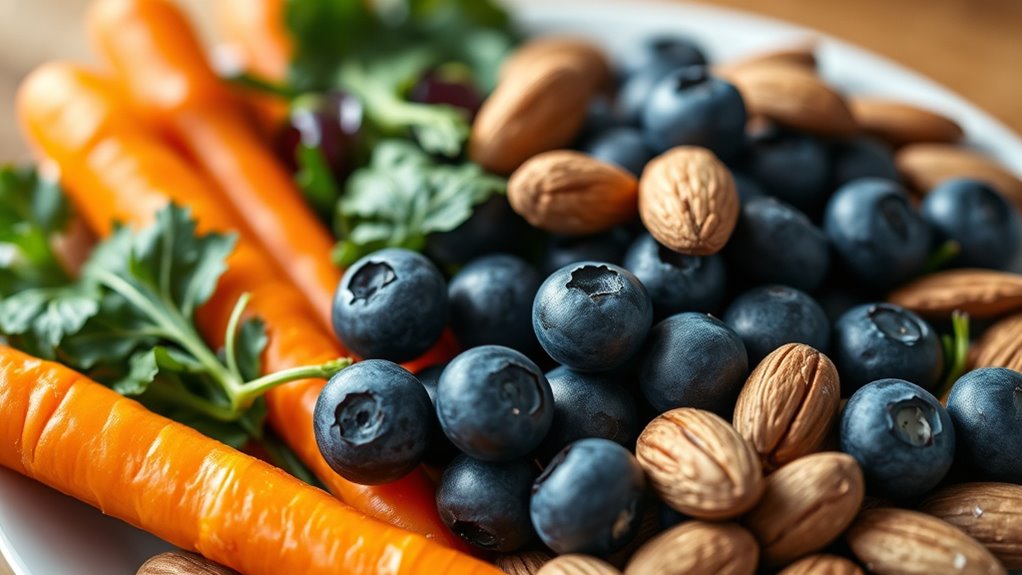Yes, diet can help reduce dark circles by providing nutrients your eyes crave. Eating foods rich in antioxidants like berries and leafy greens fights skin damage and boosts overall skin health. Iron-rich foods such as spinach and lean meats help prevent dark circles caused by anemia. Staying well-hydrated keeps skin plump and vibrant. Combining these dietary choices with good sleep and herbal remedies can make a real difference. Explore further to discover how these nutrients work together for brighter eyes.
Key Takeaways
- Consuming iron-rich foods like spinach and lean meats helps prevent dark circles caused by anemia.
- Antioxidant-rich foods such as berries and leafy greens protect skin from damage and improve eye area health.
- Staying well-hydrated maintains skin plumpness and reduces the appearance of darkness under the eyes.
- Nutrients like vitamins C, E, and K support collagen production and strengthen blood vessels around the eyes.
- A balanced diet combined with good sleep and herbal remedies enhances overall skin rejuvenation and reduces dark circles.

Dark circles under your eyes can often be linked to your diet, as what you eat directly affects your skin’s health and appearance. When your body isn’t getting the right nutrients, your skin can become dull, thin, and more prone to showing discoloration. One way to combat this is by exploring herbal remedies, which have been used for centuries to boost skin health and reduce inflammation. Ingredients like chamomile, green tea, and aloe vera can soothe the skin and improve circulation, helping to diminish the appearance of dark circles. These natural remedies work best when combined with good sleep hygiene, which is essential for skin rejuvenation. Consistently maintaining a regular sleep schedule, avoiding screens before bed, and creating a calming bedtime routine can help guarantee you get quality rest. When you’re well-rested, your body produces less cortisol, a stress hormone that can break down collagen and make dark circles more prominent.
Proper sleep hygiene not only enhances your rest but also supports your dietary efforts. If you’re tired and sleep-deprived, your body produces more adrenaline and cortisol, which can cause blood vessels under your eyes to dilate, leading to a darker appearance. Combining improved sleep habits with a nutrient-rich diet can make a significant difference. Focus on foods high in antioxidants, such as berries, leafy greens, and nuts, which fight free radicals that damage skin cells. Iron-rich foods like spinach, lean meats, and legumes are also essential, especially if your dark circles are related to iron deficiency or anemia. Hydration plays a fundamental role too, so drink plenty of water throughout the day to keep your skin plump and healthy. Incorporating advanced skincare technology like LED therapy or light-based treatments may also help improve skin tone and reduce discoloration over time.
In addition to diet and sleep hygiene, herbal remedies offer a natural boost. Applying cooled herbal teas or extracts like chamomile or green tea bags on your eyes can reduce puffiness and discoloration. These remedies work by constricting blood vessels and calming inflamed skin. Remember, consistency is key—integrate these practices into your daily routine for best results. Improving your diet with specific nutrients, adopting sleep hygiene habits, and utilizing herbal remedies can collectively help reduce dark circles and enhance your overall skin health. By giving your body what it needs and creating a healthy environment for your skin to heal, you’ll notice a brighter, more refreshed look over time.
Frequently Asked Questions
Can Certain Foods Worsen Dark Circles?
Certain foods can worsen your dark circles, especially if you consume too much sugar, which can lead to inflammation and skin issues. Food allergies might also trigger skin reactions or swelling under your eyes, making dark circles more noticeable. To improve your eye area, cut back on sugar and identify any food allergies. Eating a balanced diet rich in nutrients helps reduce inflammation and supports healthier skin around your eyes.
Are Supplements More Effective Than Diet?
Supplements can feel like secret weapons, but they’re only as effective as your nutrient absorption and supplement timing. While they deliver concentrated nutrients quickly, a balanced diet provides essential vitamins and minerals your eyes crave more sustainably. You’ll get better results by combining both, ensuring your body absorbs nutrients efficiently and takes advantage of ideal supplement timing. Remember, supplements aren’t magic—they work best when paired with a healthy, nutrient-rich diet.
How Long to See Results From Dietary Changes?
You’ll typically start noticing improvements in dark circles within a few weeks of changing your diet, but it varies based on your lifestyle habits and sleep quality. Consistently eating nutrient-rich foods like vitamin C and iron, while maintaining good sleep hygiene, speeds up results. Stick with your new habits for at least 4-6 weeks to see a visible difference, and remember that patience and consistency are key.
Do Genetics Influence Dietary Impact on Dark Circles?
Think of your genetic predisposition as the blueprint of a house—hereditary factors shape the foundation of your dark circles. While a nutritious diet can brighten your eyes, it can’t rewrite hereditary scripts. Genetics influence how your body responds to dietary changes, meaning some people might see less impact despite eating well. Acknowledging these hereditary factors helps set realistic expectations and guides you to explore other solutions alongside diet.
Can Hydration Alone Improve Dark Circles?
You might wonder if hydration alone can improve dark circles. While drinking enough water is essential, hydration myths suggest that simply increasing water intake isn’t a magic fix. Quality matters too—poor water quality can hinder your skin’s health. Staying well-hydrated helps reduce puffiness and improves skin elasticity, but for best results, combine proper hydration with good sleep, a balanced diet, and addressing other factors affecting your eye area.
Conclusion
Your diet can substantially impact the appearance of dark circles, nourishing your eyes from within. Just as a well-balanced meal brightens your face, neglecting nutrients leaves shadows that linger. Remember, what you feed your body reflects in your eyes—bright and vibrant or dull and tired. So, choose foods wisely, because sometimes, the simplest change in your diet can make a world of difference, turning exhaustion into radiance and shadows into brightness.









